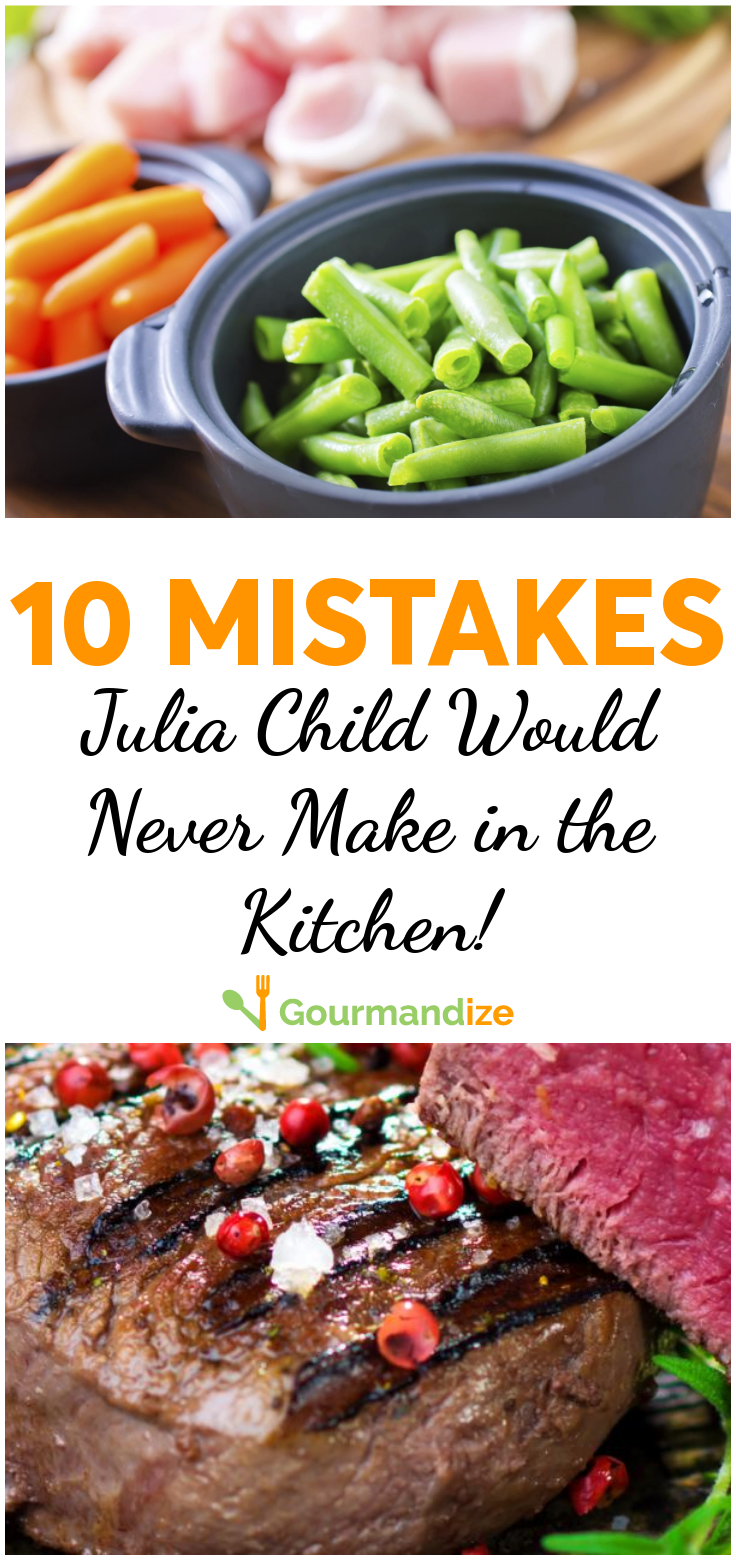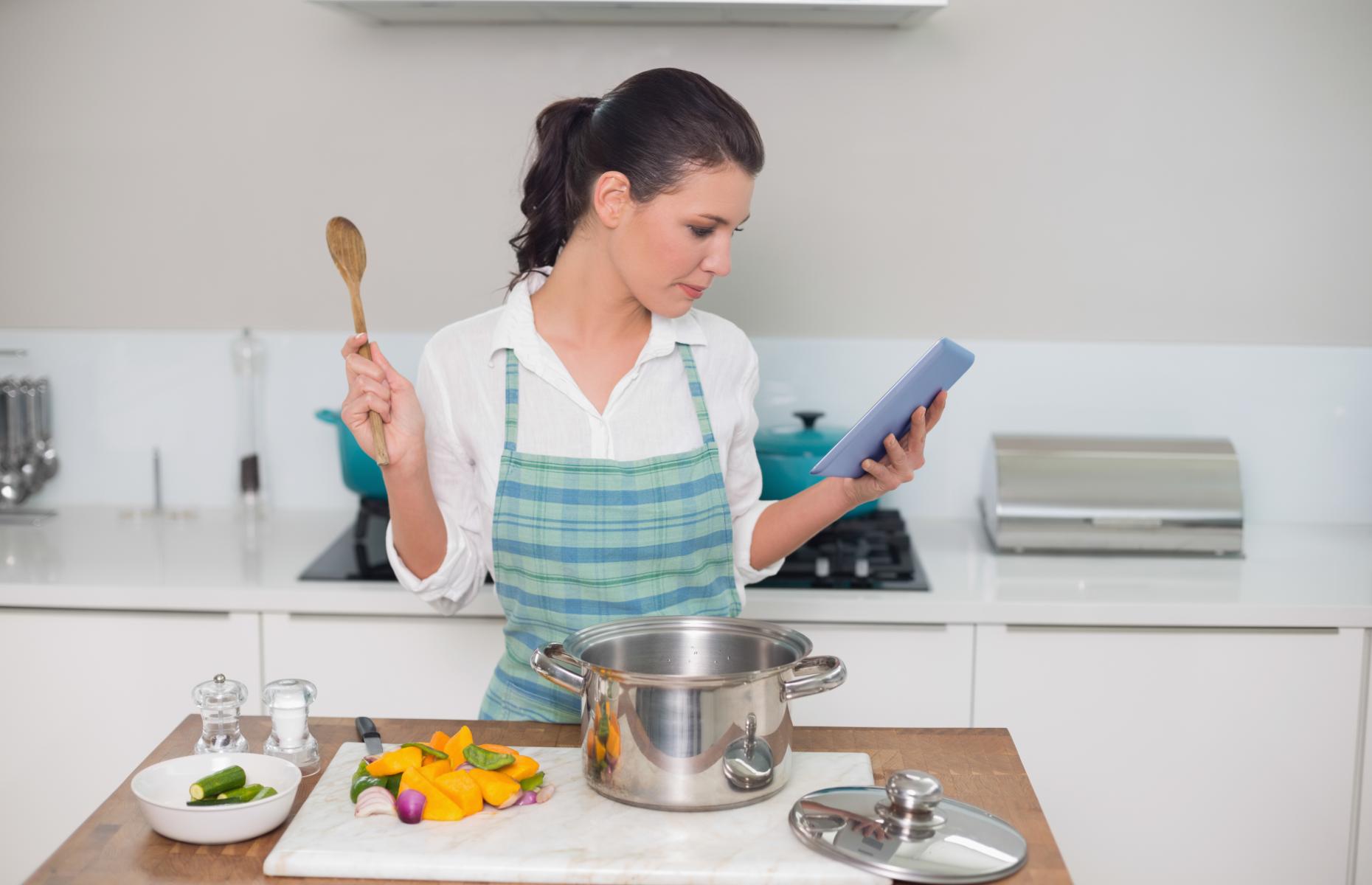10 mistakes Julia Child would never make in the kitchen!

Undercooked pork chops, rock-hard pie crust and mushy pasta have happened to everyone, right? Nobody’s perfect and we all mistakes in the kitchen. But often the greatest cooking disasters happen due to small, simple mistakes.
So we’ve made a list of the top 10 mistakes that you should never (again) make in the kitchen. Follow our list and we know Julia Child would be proud of you.
So, make sure you avoid:
Overheating food

When a recipe calls for simmering on low heat, don’t try to take a shortcut by boiling. There’s no way that you’ll ever be able to cut 3 hours cooking time down to 30 minutes. So take it easy and let low heat do its job when necessary. If you rush the process, you’ll ruin the recipe. The same goes for butter: when a recipe calls for softened butter, don’t rush to melt it in the microwave. Be patient, and always remember to prep your ingredients beforehand.
Adding oil to pasta water

So many people like to add a drizzle of oil to the pasta water to keep them from sticking to each other. But the problem with this method is that since the pasta becomes slippery due to the oil, the sauce also has a hard time sticking to the pasta and doesn’t get absorbed properly. Next time you make pasta, try cooking it in a larger pot; this way it will release more starch, which means that it won’t all clump together.
Overcooking green vegetables

Green vegetables (like asparagus, green beans or broccoli) require a short amount of cooking. 8-10 minutes are actually more than enough for green beans to be properly cooked! To make sure that they stay crunchy, try putting them in an ice-water bath in order to stop them from overcooking.
Overmixing dough

If you over mix your homemade dough the result will be a dry, flavorless crust. Over mixing can also have the completely opposite effect: your dough ends up so sticky and elastic that you can’t even roll it out. So take it easy when it comes to kneading or mixing dough and stop as soon as all the ingredients are well incorporated.
flipping meat too often

You’re so hungry and ready to eat that you’re standing in front of the stove, eagerly flipping your breaded chicken cutlet every 5 seconds. Stop! If you want a nice, crunchy layer then don’t flip the cutlet too often. And don’t flatten it against the pan either. Leave it alone and flip it only once or twice per side, maximum.
Putting all the salt in the marinade

Nutritionists go on and on about limiting our salt intake – that’s why they always tell us to only use salt at the end, once the food is finished cooking. And it’s true, because if you add too much salt to your marinade, then you actually stop it from properly seasoning the food. So leave the salt shaker on the dinner table and only use it as a seasoning once your food is done and ready to eat.
abusing lettuce leaves

There’s nothing better than a fresh, crispy salad with a delicious, homemade salad dressing. So be sure to add that dressing at the very last minute, otherwise it will literally ‘cook’ the salad leaves, resulting in a soggy mess. The same applies to when you’re washing the leaves; try ice cold water, dry well and then keep refrigerated until you’re ready to eat.
not putting enough sauce in lasagna

For the millionth time, you slave over homemade lasagna and end up with burnt edges and an uncooked middle. But why? To avoid this problem, you need to generously coat the sheets of pasta with sauce. Not only must the sauce cover all of the pasta (edges included), but you really need several layers of sauce and pasta in order for the lasagna to cook properly.
Not waiting until your pan is hot enough

You’re starving. You turn on the stove and immediately put your pork chop in the pan. Big mistake! If you don’t wait for your pan to be hot enough then your meat will not cook properly. Not only will it lack color but it will also get that awful, rubbery texture. So make sure your pan is piping hot before adding any food to it!
Cooking meat that has just come out of the fridge

Thermal shock is the mortal enemy of a good steak. Always be sure to take meat out of the fridge at least 5 minutes (but ideally 15 minutes) before cooking it. If you don’t, then you risk ending up with a steak that’s burnt on the outside and raw on the inside!
More steaming articles
 10 foods you should NEVER store in the...
10 foods you should NEVER store in the...
 Red wine and cheese: friends or foes?
Red wine and cheese: friends or foes?
 What is a Gluten Free Diet?
What is a Gluten Free Diet?
Chef Tips and Tricks
Do you put the pasta in without waiting for the water to boil? Add oil? Forget the salt?



Comment on this article